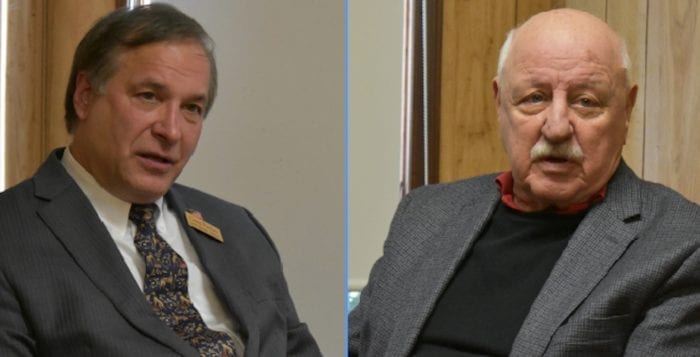It’s déjà vu in New York State’s 1st Senate District.
State Sen. Ken LaValle (R-Port Jefferson) finds himself once again being challenged by Democrat Greg Fischer to retain his seat representing the district. The two squared off in 2016 when LaValle won with more than 67 percent of the vote.
“We’ve created literally a generation of homeless people.”
— Greg Fischer
Fischer, a Calverton resident and businessman who specializes in strategizing and consulting, said during a debate featuring the candidates at the TBR News Media office in Setauket he is concerned that no one on either side of the political aisle is doing anything to increase personal incomes in the state. He said this lack of progress is leading to a brain drain on Long Island where residents pay the overhead to educate the youth but get none of the benefits when they move on for better opportunities.
“We’ve created literally a generation of homeless people,” Fischer said. “Those are people that can’t leave their houses and have their own homes. But they’re not necessarily on the streets — they’re on the couches or they’re still in their childhood bedrooms.”
When it comes to strengthening the economy, LaValle said he sees potential in places like the Research and Development Park at Stony Brook University and Cold Spring Harbor Laboratory as economic centers on Long Island. He said he supports more high-tech parks being constructed along the expressway to connect to these centers.
“We cannot afford one system for all.”
— Ken LaValle
The two had differing opinions on how to improve transportation for Long Islanders. While LaValle is looking locally, Fisher is thinking more statewide.
Fischer is proposing a bond-funded transportation system which would produce jobs statewide to connect New York City and Long Island to places like Quebec in Canada and Buffalo, and everywhere in between. He said the system would use subterranean vehicles able to go 150 mph on tracks that curve and 600 mph on straight tracks.
“It creates tens of thousands of jobs,” Fischer said, adding the use of bonds to fund such a project would see immediate payback.
The incumbent said he has led the charge in getting a state investment of $150,000 to conduct a feasibility study of electrifying the northern Long Island Rail Road line between Huntington and Port Jefferson, something he said people have talked about since before he took office 42 years ago.
“I believe, especially considering the economics of our day, that health care becomes a right.”
— Greg Fischer
“It’s something that I think that we’re finally, with money that I put in, that we’re going to get some attention,” the incumbent said.
Fischer criticized the idea of committing funds to invest in what he called “outdated technology.”
“No matter how much money we spend on horses and buggies it’s not going to help us,” Fischer said.
Both candidates said they believe better health care should be accessible to all.
“I believe, especially considering the economics of our day, that health care becomes a right,” Fischer said.
LaValle said the goal of the senate is to ensure access to health care for all. However, there are obstacles.
“We cannot afford one system for all,” LaValle said. “We tried. We looked at Obamacare and other types of things. I think we need to tweak what we have and make sure that no person goes without health care.”
“Waste, fraud and abuse cannot be tolerated at any time.”
— Ken LaValle
When it comes to education, Fischer said he believes there should be an inspector general assigned to NYS Education Department to investigate departmental waste, as its expenses are more than 50 percent of the state budget. He said currently any waste and mismanagement falls to the attorney general while other departments have inspector generals. Fischer, who has done audits of school districts, said he has found a lot of waste including not using best-value contracting.
LaValle said he has no problem looking into an inspector general for education.
“Waste, fraud and abuse cannot be tolerated at any time,” LaValle said.
Both candidates agreed more could be done for those suffering from drug addiction, especially in schools and colleges, including organizing public forums.
“Young people growing up today have lots of pressures, and it’s starting to show in so many ways, opioids being one of them,” LaValle said.
Fischer said he believes addiction comes from helplessness many young people feel from not being able to make a decent living and afford their own homes.
“As you become less and less of a stakeholder in the future, you destroy yourself,” Fischer said.





